SUMMARY
This is AI generated summarization, which may have errors. For context, always refer to the full article.
![[In This Economy] Brace yourselves for more deficits, debt](https://www.rappler.com/tachyon/2023/09/TL-Brace-yourselves-deficit-debt-September-29-2023.jpg)
Filipinos are easily triggered by news about the national debt. And it’s a legitimate concern.
The statistics are unsettling. Figure 1 below shows that the government’s budget deficit (or revenue shortfall) ballooned from 2020. Last year, 2022, the deficit reached a whopping P1.6 trillion, or about 7.33% of the national income.
To put that in perspective, that’s 2.4 times the deficit in 2019 or right before the pandemic. President Ferdinand Marcos Jr. and his economic team also aim to bring down the deficit to 3% by 2026.
Figure 1.
Incurring large deficits is troubling since they directly contribute to the national debt, which as of July 2023, stood at P14.24 trillion.
Of course, economists prefer to look at debt in proportion to national income, measured by the debt-to-GDP ratio. In June 2023, it was still at 61%, or way above the 39% in 2019 (Figure 2). The government’s (rather modest) goal is to reduce this to just below 60% by 2025.
Figure 2.
While the debt-to-GDP ratio won’t likely balloon to, say, 100% any time soon, bringing it down will be a tall order: at the same time that the government is struggling to raise more revenues, it really can’t significantly cut down on spending. So, to the extent the government needs to spend, it really needs to spend wisely.
Let’s look at some specific threats to the country’s public coffers in the coming years.
Lack of revenues
The fact is, the government needs to earn a lot more revenues than it is currently collecting.
Figure 3 shows that government revenues have been rising again since 2020. But as a percent of GDP, revenues in 2022 were just about the same as in 2019.
If the government fails to earn much more revenues, it will be hard put to reduce the deficit and debt ratios any further.
Figure 3.
This is why the government is desperately looking for ways to earn more money, and Marcos himself keeps saying that they will expand the country’s “fiscal space” (or budgetary room for spending) by levying new taxes.
Government is currently pursuing reforms on passive income and financial intermediary taxation (a carryover from the Duterte administration), which aims to harmonize taxes on interest income, dividends, and capital gains.
They also plan to levy a value-added tax on digital services (think YouTube, Netflix, etc.), excise taxes on single-use plastics and premixed alcohol, taxes on junk food and sweetened beverages (above the ones imposed by the 2017 TRAIN law), motor vehicle road user’s tax, and mining.
Of these, the government projects that the biggest revenue generator would be the taxes on sweetened beverages and junk food. But all in all, the collective revenues projected from all these are rather modest: on average, P152 billion per year from 2024 to 2026. That’s just a little over half a percent of GDP per year.
To make things more complicated, the Marcos government doesn’t have a lot of credibility in asking for more tax money, since the president himself and his family have been refusing to pay (for decades) estate taxes that have now ballooned to at least P203 billion.
Why would ordinary Filipinos pay taxes (and contribute to the expansion of the government’s fiscal space) if the president himself doesn’t want to pay his dues?
Military, police pensions
Problems also abound in the spending side of things.
Of course, as the economy progresses, one can reasonably expect government spending to increase as well. And that’s the case in Figure 4: total spending has been increasing in absolute terms and as a percent of GDP.
Figure 4.
But there’s one issue that stands to result in an explosion of government obligations: the pensions of military and uniformed personnel (MUPs).
Currently, the government owes retired MUPs about P5.58 trillion (with a T) worth of pensions. This number comes from the estimates of Representative Joey Salceda, chair of the House committee on ways and eans.
To put that in perspective, that’s nearly as large as the P5.7 trillion proposed budget for the entire government in 2024!
Because of this, the government is constrained to allot increasingly larger budgets for MUP pensions each year. For 2024, the government planned to allot P257 billion for MUP pensions alone, up by 62% from just P158.4 billion in 2023.
This matters because ballooning MUP pensions will definitely contribute to the country’s already colossal deficit and debt. They will also eat away at other important public services like education and health.
This is why I support the Department of Finance’s efforts to pursue MUP pension reform. Before she was unceremoniously sacked by the Marcos administration, my friend and UPSE colleague Cielo Magno was the finance undersecretary overseeing this.
She and Finance Secretary Benjamin Diokno pushed for sensible reforms, such as mandatory contributions for all MUPs, the stoppage of pension indexation (currently, pensions are pegged to the salaries of retirees plus one rank higher), and a government counterpart or contribution to MUP pensions (alongside MUPs’ contributions, it’s ideal for the government to also contribute a certain amount to the pension fund).
The House on September 26 passed on final reading an MUP pension reform bill. However, it’s so watered down it’s almost the status quo.
Essentially, the bill stipulates that there will be no mandatory contributions (except for new MUPs), full indexation will continue (but it’s just half for new entrants), and there will be no government counterpart for all MUPs (save for new recruits). Active members will receive a 3% increase of their salaries per year for the next decade.
Is this a joke? All of these provisions defeat the purpose of MUP pension reform.
Of course, the MUPs themselves strongly opposed this; why would they want their benefits to be reduced? But I’m afraid this will come at the cost of a huge drain on the public coffers in the coming decades, further deteriorating the country’s fiscal space.
Confidential funds
There are many other issues, like the need for government rightsizing (whittling away needless agencies or departments), as well as the pursuit of public-private partnerships (so that key infrastructure projects don’t need to be financed by government per se).
But I’ll just mention one more thing about spending: the confidential and intelligence funds, which seem to be the favored kitty of our leaders, notably, President Marcos and Vice President Sara Duterte themselves.
Figure 5 shows that the Office of the President’s confidential and intelligence funds rose by 5 times from 2016 to 2017, starting with the first budget of former president Rodrigo Duterte. Then these funds nearly doubled again by 2020.
Figure 5.
Meanwhile, Figure 6 shows that for the longest time, the Office of the Vice President never had confidential expenses – until 2023, when Sara Duterte came in and requested P500 million. She’s requesting the same amount again for next year, on top of the P150 million in confidential funds she’s asking for the Department of Education (DepEd) which she’s also heading (the DepEd also got confidential funds for the first time ever).
Figure 6.
Apart from being needless, the problem with these funds is that they’re opaque and hardly auditable (technically, they can be audited by the Commission on Audit, but the COA never divulges the details to the public).
The most recent scandal, of course, is the fact that Duterte’s OVP spent P125 million in confidential funds in 11 days by end-2022. That’s P23,674 per second. How is that even possible?
In a time of growing deficits and debt – as well as multi-crises like sky-high prices and the 90% learning poverty rate – more people are paying attention to the profligate spending of Marcos and Duterte.
They and other top officials must lead by example by spending wisely and prudently. Otherwise, they’ll just come off as greedy and spoiled brats in the eyes of more and more people. – Rappler.com
JC Punongbayan, PhD is an assistant professor at the UP School of Economics and the author of False Nostalgia: The Marcos “Golden Age” Myths and How to Debunk Them. JC’s views are independent of his affiliations. Follow him on Twitter (@jcpunongbayan) and Usapang Econ Podcast.
2 comments
How does this make you feel?
![[In This Economy] Why Marcos is getting high on unprogrammed funds](https://www.rappler.com/tachyon/2024/07/TL-marcos-program-funds-july-19-2024.jpg?resize=257%2C257&crop=265px%2C0px%2C720px%2C720px)
![[In This Economy] Is the Marcos government unlawfully dipping into PhilHealth funds?](https://www.rappler.com/tachyon/2024/07/marcos-government-philhealth-funds-july-12-2024.jpg?resize=257%2C257&crop=425px%2C0px%2C1080px%2C1080px)


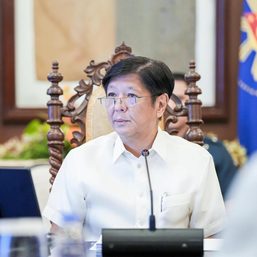







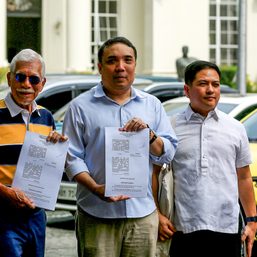
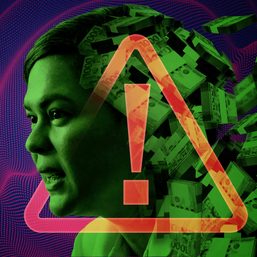
![[In This Economy] Marcos’ POGO ban is popular, but will it work?](https://www.rappler.com/tachyon/2024/07/thought-leaders-marcos-pogo-ban.jpg?resize=257%2C257&crop=255px%2C0px%2C720px%2C720px)
![[Rappler Investigates] POGOs no-go as Typhoon Carina exits](https://www.rappler.com/tachyon/2024/07/newsletter-graphics-carina-pogo.jpg?resize=257%2C257&crop=424px%2C0px%2C1080px%2C1080px)



![[EDITORIAL] Apat na taon na lang Ginoong Marcos, ‘di na puwede ang papetiks-petiks](https://www.rappler.com/tachyon/2024/07/animated-bongbong-marcos-2024-sona-day-carousel.jpg?resize=257%2C257&crop=280px%2C0px%2C720px%2C720px)
![[In This Economy] Delulunomics: Kailan magiging upper-middle income country ang Pilipinas?](https://www.rappler.com/tachyon/2024/07/in-this-economy-upper-middle-income-country.jpg?resize=257%2C257&crop=421px%2C0px%2C1080px%2C1080px)

![[EDITORIAL] Marcos Year 2: Hilong-talilong](https://www.rappler.com/tachyon/2024/07/animated-bongbong-marcos-2nd-sona-carousel.jpg?resize=257%2C257&crop=136px%2C0px%2C720px%2C720px)
![[Newspoint] A fighting presence](https://www.rappler.com/tachyon/2024/07/thought-leaders-a-fighting-presence.jpg?resize=257%2C257&crop=441px%2C0px%2C1080px%2C1080px)
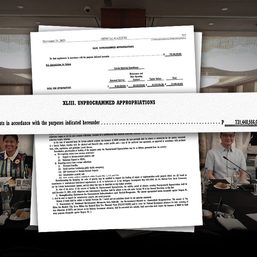
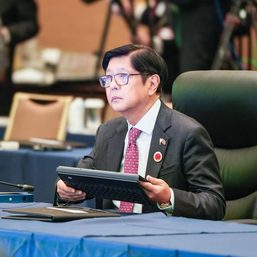





![[Rappler’s Best] Knowing when to leave](https://www.rappler.com/tachyon/2024/07/biden-sara-gfx.jpg?resize=257%2C257&crop_strategy=attention)
Thanks again to Prof. JC Punongbayan for another enlightening economic article entitled, “Brace yourselves for more deficits, more debts.” For now, it is unrealistic to expect that “They and other top officials must lead by example by spending wisely and prudently.” They way the recent National Budget was deliberated in the HOR: we indeed see that they are “greedy and spoiled brats.” The same is expected of the Senate. Hence, our economic situation may be expressed in these two equations: [Equation 1] increasing deficits + increasing debt = increasing budget; [Equation 2] increasing budget (amount here is derived from Equation 1) + increasing corruption =? I hope that Prof. JC Punongbayan will comment on these equations in his next article(s).
IMO it’s more of: growing economy & population -> bigger gov’t budget -> bigger deficits & debt (if revenues are not growing so much). Of course, a bigger budget also invites greater corruption, especially if top officials—who are supposed to set an example—can’t help themselves (e.g., huge confidential/intelligence funds).